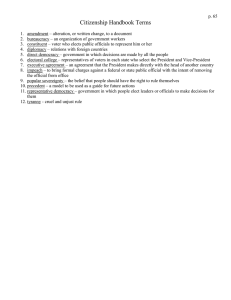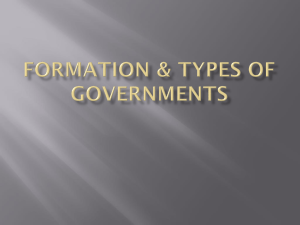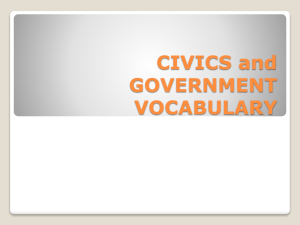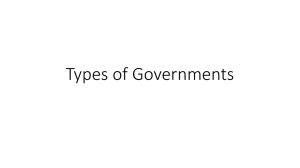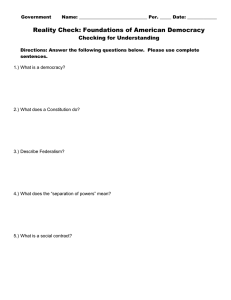What is Government? • Institution through which a society makes and
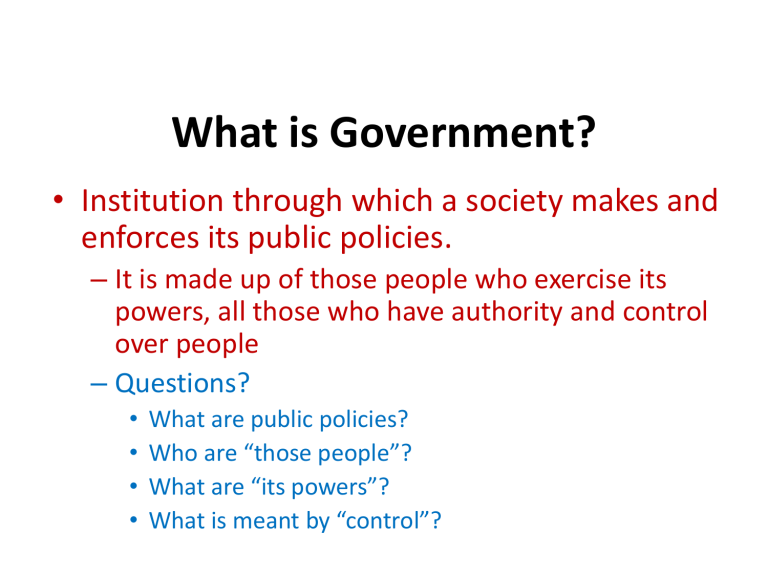
What is Government?
• Institution through which a society makes and enforces its public policies.
– It is made up of those people who exercise its powers, all those who have authority and control over people
– Questions?
• What are public policies?
• Who are “those people”?
• What are “its powers”?
• What is meant by “control”?
Every government exercises power
• Their concepts of legislative, executive and judicial are just different.
• But what is the interaction between these branches and that of the citizenry of the state. It is . . .
The State
• A body of people , living in a defined territory , organized politically , and with the power to make and enforce law without the consent of any higher authority .
The Force Theory
• For over a thousand generations, the Jedi knights were the guardians of peace and justice in the old Republic... before the dark times... before the empire.
• Might makes right
• When a person or small group claimed control over an area and forced all within it to submit to that person’s or group’s rule.
The Evolutionary Theory
• Government developed naturally out of the family unit
– Then a network of related families
– Then a clan
– Then a tribe
– Then after tribes developed agriculture and nomadic ways ended, the modern state began to develop
The Divine Right Theory
The Social Contract Theory
Social Contract Theory
• Thomas Hobbes
– “In the state of nature profit is the measure of right.”
• John Locke
– “Government has no other end, but the preservation of property.”
• Jean Jacques Rousseau
– “Man is born free, and everywhere he is in chains.”
Purpose of Government (at least ours-
What does each really mean? Does
America accomplish these?)
• Form a More Perfect Union
• Establish Justice
• Insure Domestic Tranquility
• Provide for the Common Defense
• Promote the General Welfare
• Secure the Blessing of Liberty
Classifying Governments
• Who can participate?
• What is the geographic distribution of governmental power within the state?
• What is the relationship between the legislative and executive branches?
Who can participate?
•
Democracy
•
Oligarchy
•
Dictatorship
Basic Concepts of Democracy
• I can
– Understand the foundations of democracy
– Analyze the connections between democracy and the free enterprise system
– Identify the role of the Internet in a democracy
What does this image say about democracy? Do you agree?
Basic Notions of Democracy
• A recognition of the fundamental worth and dignity of every person
• A respect for the equality of all persons
• A faith in majority rule and an insistence upon minority rights
• An acceptance of the necessity of compromise
• An insistence upon the widest possible degree of individual freedom
What Hart Adds to This Definition
• Control over government decision about policy is constitutionally vested in elected officials
• Elected officials are chosen in frequent and fairly conducted elections
• Practically all adults have the right to vote
• Practically all adults have the right to run for elective office
• Citizens should have the rights to express themselves without danger of severe punishment
• Citizens have a right to seek out alternative sources of information
• Citizens have the right to form relatively independent associations or organizations
• Popularly elected officials cannot be overridden by unelected officials
• The polity must be self-governing
What does this say about democracy?
Do you agree? Solutions?
What an oligarchy might look like.
Bellwork
• Review: what are the 4 characteristics of the state?
Refresh your memory
• Barney Fife
• Schoolhouse Rocks
Geographic
Distribution of Power
•
Unitary
•
Federal
•
Confederate
National Government State Government
* Print money
* Regulate interstate (between states) and international trade
* Make treaties and conduct foreign policy
* Declare war
* Provide an army and navy
* Establish post offices
* Make laws necessary and proper to carry out the these powers
* Issue licenses
* Regulate intrastate (within the state) businesses
* Conduct elections
* Establish local governments
* Ratify amendments to the Constitution
* Take measures for public health and safety
* May exert powers the Constitution does not delegate to the national government or prohibit the states from using
Relationship Between
Legislative and Executive
Branches
• Presidential
• Parliamentary
• Semi-Presidential
